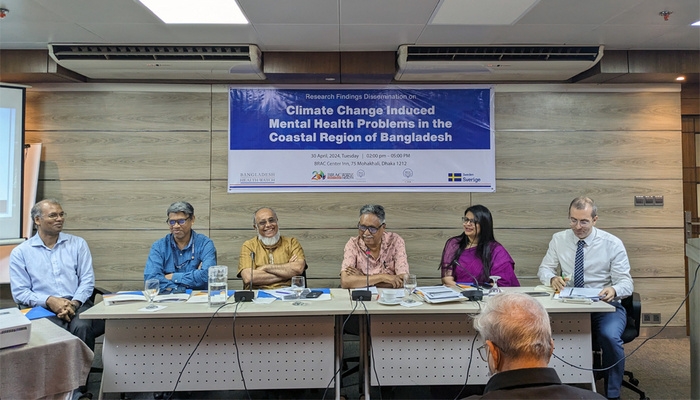

A recent research titled "Climate Change Induced Mental Health Problem in the Coastal Region of Bangladesh" shows a substantial prevalence of mental health disorders among a surveyed population of Shyamnagar Satkhira, including moderate to extremely severe anxiety (25.07%), depression (22.48%), stress (49.42%), PTSD (20.03%), and poor sleep quality (43.95%). The study was carried out by the Centre for Climate Change and Environmental Research, BRAC University and Bangladesh Health Watch. The findings were disseminated today in the capital’s Brac Centre Inn on 30th April with the presence of climate and environment researchers, academicians etc.
On that occasion, Dr Ainun Nishat, Professor Emeritus, Centre for Climate Change and Environmental Research and Professor Emeritus Brac University were present as Chief Guest. Dr Helal Uddin Ahmed, Associate Professor, National Institute of Mental Health (NIMH), and Dr Daniel Novak, First Secretary, Embassy of Sweden were present as special guests.
The study highlighted that the Shyamnagar area is highly vulnerable to climate change due to its low-lying geography, making it highly susceptible to natural hazards like cyclones, coastal flooding, sea-level rise, and coastal erosion, etc. Among the respondents, 23.6% identified cyclones and storm surges as the most prevalent climate-induced hazard.
In the occasion the Chief Guest, Dr Ainun Nishat says, “Climate change is not the static issue. This has a long term impact in people, their lives livelihoods etc. it is good that the baseline study has been done. Now we have to follow-up the families to know the further impact of climate change and mental health.
The Special Guest, Dr Helal Uddin Ahmed says,” Climate Change and mental health have a synergic effect. People have personality problems due to climate change effects. The researchers should give subjective importance while conducting the study.
Dr Daniel Novak highlighted the importance of telemedicine, inclusion of health in National Adaptation Plan. He said, “Climate Change is dangerous, in Sweden, people are killing their babies knowing the future impact of climate change.”
The study finds that there are challenges in accessing healthcare; such as a shortage of healthcare facilities and skilled professionals, limited psychosocial support, shortages of medicine and diagnostic constraints are prevalent, and unaffordable private healthcare services.
The study identified some major contributing factors like livelihood constraints, mobility challenges, community disruptions, heightened migration rates, and domestic and social conflicts. These results underscore the pressing need for tailored interventions and support mechanisms to effectively address these mental health burdens.
The community people employ various coping strategies like; borrowing loans, alternative livelihoods, traditional medicines from Kabiraj, and Communicating with friends and neighbors etc.
The study recommended, enhancing mental health services provision,allocate adequate budgets, establish surveillance mechanisms, and counseling units, and integration into National Adaptation Plan (NAP) and National Health Adaptation Plan (HNAP): Adaptation strategies need to consider mental health impacts, focusing on vulnerable groups, updates to policy and legislative frameworks, and enhance healthcare facilities and provisions for mental health service providers.
Citizen's Voice